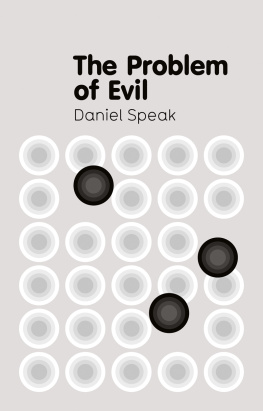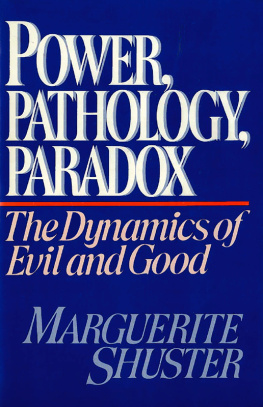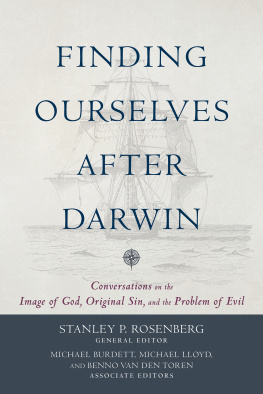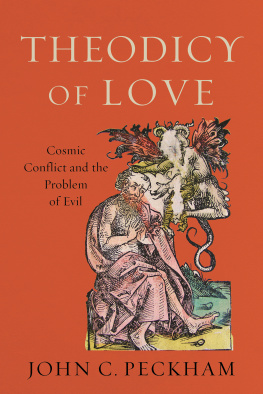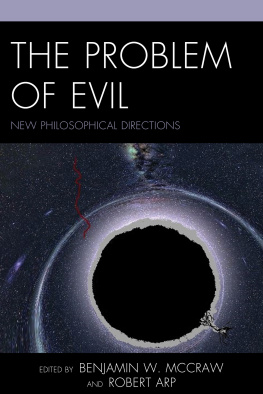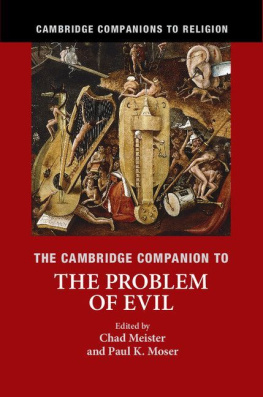Speak - The problem of evil
Here you can read online Speak - The problem of evil full text of the book (entire story) in english for free. Download pdf and epub, get meaning, cover and reviews about this ebook. City: Cambridge, year: 2015, publisher: Polity, genre: Religion. Description of the work, (preface) as well as reviews are available. Best literature library LitArk.com created for fans of good reading and offers a wide selection of genres:
Romance novel
Science fiction
Adventure
Detective
Science
History
Home and family
Prose
Art
Politics
Computer
Non-fiction
Religion
Business
Children
Humor
Choose a favorite category and find really read worthwhile books. Enjoy immersion in the world of imagination, feel the emotions of the characters or learn something new for yourself, make an fascinating discovery.
The problem of evil: summary, description and annotation
We offer to read an annotation, description, summary or preface (depends on what the author of the book "The problem of evil" wrote himself). If you haven't found the necessary information about the book — write in the comments, we will try to find it.
The problem of evil — read online for free the complete book (whole text) full work
Below is the text of the book, divided by pages. System saving the place of the last page read, allows you to conveniently read the book "The problem of evil" online for free, without having to search again every time where you left off. Put a bookmark, and you can go to the page where you finished reading at any time.
Font size:
Interval:
Bookmark:

- Heather Battaly, Virtue
- Lisa Bortolotti, Irrationality
- Joseph Keim Campbell, Free Will
- Roy T. Cook, Paradoxes
- Douglas Edwards, Properties
- Bryan Frances, Disagreement
- Douglas Kutach, Causation
- Ian Evans and Nicolas D. Smith, Knowledge
- Joshua Weisberg, Consciousness
- Chase Wrenn, Truth

Copyright Daniel Speak 2015
The right of Daniel Speak to be identified as Author of this Work has been asserted in accordance with the UK Copyright, Designs and Patents Act 1988.
First published in 2015 by Polity Press
Polity Press
65 Bridge Street
Cambridge CB2 1UR, UK
Polity Press
350 Main Street
Malden, MA 02148, USA
All rights reserved. Except for the quotation of short passages for the purpose of criticism and review, no part of this publication may be reproduced, stored in a retrieval system, or transmitted, in any form or by any means, electronic, mechanical, photocopying, recording or otherwise, without the prior permission of the publisher.
ISBN-13: 978-0-7456-6406-4
ISBN-13: 978-0-7456-6407-1 (pb)
ISBN-13: 978-0-7456-1795-4 (epub)
ISBN-13: 978-0-7456-1794-7 (mobi)
A catalogue record for this book is available from the British Library.
The publisher has used its best endeavours to ensure that the URLs for external websites referred to in this book are correct and active at the time of going to press. However, the publisher has no responsibility for the websites and can make no guarantee that a site will remain live or that the content is or will remain appropriate.
Every effort has been made to trace all copyright holders, but if any have been inadvertently overlooked the publisher will be pleased to include any necessary credits in any subsequent reprint or edition.
For further information on Polity, visit our website: politybooks.com
For my wife, Lori Speak, whose love and friendship remind me that evil will not have the last word
Many thanks to Emma Hutchinson of Polity Press for her initial vision, wise counsel, and constant encouragement at each stage of this project. This book owes a great deal to the many students, both undergraduate and graduate, who have taken courses with me on the topic of the problem of evil over the past few years. I have learned particularly from Katherine Brown, Curtis Holtzen, Derek von Barandy, and Alex Zambrano. Two initially anonymous reviewers for Polity Press provided extremely useful feedback on a draft of the book. Raymond VanArragon in particular, who was kind enough to come out from behind his anonymity, made a substantial contribution to the overall quality of the manuscript and saved me from a number of embarrassments including confusing the names of an influential human ecologist and a left-handed Houston Rockets shooting guard. Manuel Vargas read the entire manuscript and provided terrific suggestions throughout. A second special thanks to Katherine Brown for extraordinary copy editing and the construction of the index.
It was a great pleasure to serve as a Visiting Research Fellow at Biola University's Center for Christian Thought during the spring of 2013 and as a Visiting Scholar at Rutgers University's Center for Philosophy of Religion during the 2013/14 academic year. Both opportunities afforded me great freedom to work on this project while also providing me with nearly unlimited philosophical inspiration. Finally, I would like to thank Loyola Marymount University, the Bellarmine College of Liberal Arts, and the LMU Department of Philosophy for the sabbatical time that allowed me to take advantage of the various fellowship opportunities that made writing this book such a pleasure.
The Problem(s) of Evil
It is hard to know in advance what kind of suffering a person will have to see or experience before becoming gripped by the problem of evil. Bad-things-happening-to-children does, however, constitute a pretty reliable recipe for getting the attention of most people. I can report that my own sensitivities to the issues taken up in this book were profoundly heightened by having a child of my own and becoming, as a result, freshly attuned to the innocent vulnerability of children. I was already disposed to feel the burden of their seemingly senseless suffering (who isn't?), even before my son was born. But after his birth, my emotional nerves seemed to have been exposed painfully to the shocking air of moral reality. Reports of starving or abused children, of children forced to become slaves or soldiers, even popular movies featuring children under threat (pretend-children that I knew would be pretend-rescued near the end of the two-hour ordeal) all placed a new and swelling weight on my psyche.
I suspect that this is at least some part of the reason that the following experience still leaps immediately to mind when I find myself considering the world's evils. A decade or so back, when our son was still quite young, my wife and I were in the habit of getting together regularly (roughly, weekly) with a group of our friends at one of our homes. A little food, a little conversation, and the kids with a baby-sitter; a good evening for everyone, typically. The last time that group ever got together, however, was tragically memorable. I showed up at the home of the host, Mary, a smidge earlier than everyone else to find a pair of police cars and Mary out front. Before I could get my car parked, it became clear that Mary was absolutely distraught. The explanation for her state turned out to be that her four-year-old son had drowned in their backyard pool some short time prior to my arrival. The son, Joshua, had evidently either climbed over the short protective pool fence by way of some bigger toys pressed up against it or had come through the gate accidentally left open by the pool cleaner, who had been by earlier in the day. In one sense, it doesn't really matter what the precipitating cause was. In either case, Joshua was dead and someone was going to be left feeling guilty for the rest of his or her life. In fact, maybe the best result was that we were never able to diagnose exactly how Joshua got into the pool area. Though both Mary and the pool cleaner will have to share the worry that each may have been the cause, neither of them has to bear the burden of certainly having been. Thank God for small mercies.
But, of course, that's just the point. It seems a pathetically small mercy in this context. After all, it is incredibly hard to shake the suspicion that it would have been very easy for a being with the qualities and powers typically ascribed to God to have kept Joshua from drowning. A light breeze to close the gate or the shifting of a plastic faux barbecue away from the fence is all it would have taken. If it is easier for God to put thoughts into heads than to move things around in the macro world, then a small and unobtrusive reminder for either the pool cleaner or Mary would easily have done the trick. For this reason, we can understand why Mary (or any of us who are able to sympathize with her pain and loss) might begin to wonder if God really does exist.
And now we are alive to the problem of evil a problem constituted by an apparent tension between traditional theistic commitment, on the one hand, and an open-eyed recognition of countless instances of seemingly unjustified suffering, on the other. The family of philosophical challenges to theistic belief that we will be exploring can, in fact, be read as variations on a theme introduced in what David Hume called Epicurus' old questions:
Next pageFont size:
Interval:
Bookmark:
Similar books «The problem of evil»
Look at similar books to The problem of evil. We have selected literature similar in name and meaning in the hope of providing readers with more options to find new, interesting, not yet read works.
Discussion, reviews of the book The problem of evil and just readers' own opinions. Leave your comments, write what you think about the work, its meaning or the main characters. Specify what exactly you liked and what you didn't like, and why you think so.

